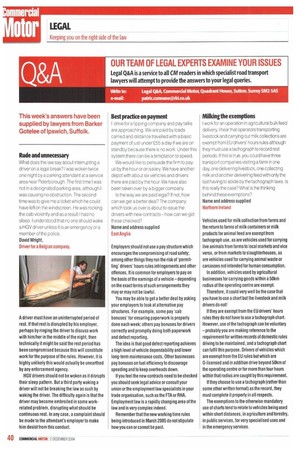Rude and unnecessary
Page 40

If you've noticed an error in this article please click here to report it so we can fix it.
What does the law say about interrupting a drlver on a legal break? I was woken twice one night by a parking attendant at a service area near Peterborough. The first time I was not in a designated parking area, although I was causing no obstruction. The second time was to give me a ticket which he could have left on the windscreen, He was rocking the cab violently and as a result I had no sleep. I understood that no one should wake a NOV driver unless it is an emergency or a member of the police.
David Wright, Driverfor a Belgian company.
A driver must have an uninterrupted period of rest. If that rest is disrupted by his employer, perhaps by ringing the driver to discuss work with him/her in the middle of the night, then technically it might he said the rest period has been compromised because this will constitute work for the purpose of the rules. However, it is highly unlikely this would actually be unearthed by any enforcement agency.
HGV drivers should not be waken as it disrupts their sleep pattern. But a third party waking a driver will not be breaking the law as such by waking the driver. The difficulty again is that the driver may become embroiled in some workrelated problem, disrupting what should be continuous rest. In any case, a complaint should be made to the attendant's employerto make him desist from this conduct.
Best practice on payment drive for a tdoping company and pay talks are approaching. We are paid by loads carried and distance travelled with a basic payment of just under £55 a day if we are on standby because there is no work. Under this system there can be a temptation to speed.
We would like to persuade the firm to pay us by the hour or on salary. We have another depot with about six vehicles and drivers there are paid by the hour. We have also been taken over by a bigger company.
Is the way we are paid legal? If not, how can we get a better deal? The company which took us over is about to issue the drivers with new contracts — how can we get these checked?
Name and address supplied East Anglia Employers should not use a pay structure which encourages the compromising of road safety: among otherthings they run the risk of 'permitting drivers' hours rules infringements and other offences. It is common for employers to pay on the basis of the earnings of a vehicle—depending ante exact terms of such arrangements they may or may nat be lawful.
You may be able to get a better deal by asking your employers to look at alternative pay structures. For example, some pay 'cab bonuses' for ensuring paperwork is properly done each week; others pay bonuses for drivers correctly and promptly doing both paperwork and defect reporting.
The idea is that good defect reporting achieves a high level of vehicle dependability and lower long-term maintenance costs. Other businesses pay bonuses on fuel efficiency to discourage speeding and to keep overheads down.
If you feel the new contracts need to be checked you should seek legal advice or consult your union or the employment law specialists in your trade organisation. such as the FTA or RHA. Employment law is a rapidly changing area of the law and is very complex indeed.
Remember that the new working time rules being introduced in March 2005 do not stipulate howyou can or cannot be paid.
Milking the exemptions
I work for an operation in agricultural bulk feed delivery. I hear that operators transporting livestock and carrying out milk collections are exempt from EU drivers' hours rules although they must use a tachograph to record rest periods. If this is true, you could have three transport companies visiting a farm in one day, one delivering livestock, one collecting milk and another delivering feed with only the last having to abide by the tachograph laws. Is this ready the case? What is the thinking behind these exemptions?
Name and address supplied Northern Ireland Vehicles used far milk collection from farms and the return to farms of milk containers or milk products for animal feed are exempt from tachograph use, as are vehicles used for carrying live animals from farms to local markets and vice versa, or from markets to slaughterhouses, as are vehicles used for carrying animal waste or carcasses not intended for human consumption.
In addition, vehicles used by agricultural businesses for carrying goods within a 50km radius of the operating centre are exempt.
Therefore, it could very well he the case that you have to use a chart but the livestock and milk drivers do not!
II they are exempt from the EU drivers' hours rules they do not have to use a tachograph chart. However, use of the tachograph can be voluntary —probablyyou are making reference to the requirement for written records of domestic rules driving to be maintained, and a tachograph chart can fulfil this purpose. Drivers of vehicles which are exempt from the EU rules but which are 0-licensed and in addition drive beyond 50km of the operating centre or for more than lour hours within that radius are caught by this requirement.
If they choose to use a tachograph (rather than some other written format) as the record, they must complete it properly in all respects.
The exemptions to the otherwise mandatory use of charts tend to relate to vehicles being used within short distances, in agriculture and forestry, in public services, for very specialised uses and in the emergency services.




















































































































































































